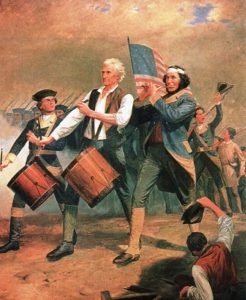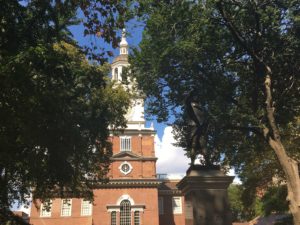 Spirit of ’76 (bit.ly/3sMbRqg)
Spirit of ’76 (bit.ly/3sMbRqg)
Every year, on the Fourth of July, I read the Declaration of Independence. Last year was different because, with increasing acuity, critics have argued that our country was established not on freedom, but on subjection. They justifiably accuse us of slaveholding and genocide. We have contrived rationalizations to explain away these crimes: religion, destiny, civilization, and even whiteness. Some among us are more guilty of these wrongs, or of defending them, than others, but even so they taint us. In 2021, as I read, I asked what, in our foundation, can help us correct our errors and build a more humane future.
 Independence Hall (bit.ly/35yDwSC)
Independence Hall (bit.ly/35yDwSC)
Consent of the governed. If a community springs from the consent of the governed, there is no subjection. The governed give their consent through their representatives. The better —the more equal— the representation, the warmer the consent, the stronger the government and therefore the community. History shows that class, race, gender, ethnicity, religion, have subverted equal representation and therefore consent of the governed. Removing these barriers would improve our community.
Pursuit of happiness. The context that bred this phrase gives it remarkable power. The dominant opponent of monarchy in the turmoil of late seventeenth-century England was the philosopher John Locke. In building his philosophy, Locke proclaimed the fundamental right of all men to life, liberty, and property. The Declaration of Independence has a similar phrase, but Thomas Jefferson changed “property” into “the pursuit of happiness.” Why? Jefferson fathered 6 children with Sally Hemmings, “his” enslaved woman, much his junior. That a slaveowner would change “property” to “the pursuit of happiness” marks a revolution in empathy. Locke’s “property” is inert; it turns persons into things — property. But happiness is a goal of living beings even if held in bondage. Jefferson’s adjustment gave our country an agenda.
The present threat. Highlighting these phrases is not mere flag-waving because, today, anti-democratic elements attack them directly. In many state legislatures, Republican majorities reduce voting rights and insert Republican poll administrators with, potentially, the ability to reverse election outcomes as Charles M. Blow has articulated in the NYTimes. (Please see Update 1, below). Moreover, some Republicans at all levels of government encouraged, participated in, and now defend the January 6 insurrection to overturn the election of 2020. In short, the followers of former president Trump seek to overthrow our democratic system to install their leader, a man who distinguished himself by his capricious despotism. “No one knows the system better than me,” he declared, “which is why I alone can fix it.” “I alone”! These people prefer tyranny to democracy.
Democracy makes us thrive. Born of a revolution to escape tyranny, America has thrived on the expansion of democracy. The federal government outlawed slavery during the Civil War. The Fourteenth Amendment promised due process and equal protection under the law to all persons. Through the Nineteenth Amendment, women gained the vote in 1919.Translated into contemporary American English, this evolution of Jefferson’s ideal becomes equal opportunity. The pursuit of happiness is simply not possible without equal opportunity guaranteed by equal protection under the law.
The law of the land. Equal opportunity is not a new phrase or a newly discovered goal, but it is time to renew our commitment to it. Equal opportunity is a cure for systemic racism, unjust disparity in wealth, and all that stems from ignorance. Perhaps no aspect of our national life is more crucial than Benjamin Franklin’s ideal of free, quality, public education. The landmark Supreme Court decision, Brown v. Board of Education, asserts: “Where a State has undertaken to provide an opportunity for an education in its public schools, such an opportunity is a right which must be made available to all on equal terms.” Opportunity on equal terms is the law of the land. The Civil Rights Act of 1964 further guaranteed equal opportunity in employment. Examples in the area of housing and gender rights such as same-sex marriage are moving in the same direction and must be encouraged. There is still work to be done.
Build the core. Because the right of all to equal opportunity is self-evident, all Americans should endorse it with the same fervor as the Declaration of Independence. Besides the rightness of this goal, I suggest we adopt the phrase as a political slogan. In a country where independent voters hold the balance of power, “equal opportunity” will strengthen our political center. It will increase the general standard of living without the excesses of socialism and the benefits of free enterprise without the excesses of monopoly capitalism.
Not socialism. Equal opportunity provides resources, education, and options to all without government-imposed uniformity because opportunity limits uniformity. Just as equality promotes education for all, opportunity fosters entrepreneurship. Opportunity is a talent scout. It seeks the standouts. It is pro-business but anti-monopoly. Opportunity advances invention, creativity, and startups while equality prevents those who have made it big from accumulating excessive power: monopolies in business and corruption in government. “Equality” and “opportunity,” therefore, check each other. Success should be available to all, but not to the point where great power can limit access to others. We do not erect a ladder for the most talented to climb only to watch them remove it.
More than individuals. Some might say this program overemphasizes government and community. Freedom, they argue, inheres only in the individual. Such people are like the man who refuses to participate in a bucket brigade. “Why?” he asks. “My house is not on fire.” Individual rights are indeed indispensable, but they are only safe when all agree, mutually, to protect them. If we can only protect ourselves as individuals without laws, with no share in making the laws, and without government to enforce them, we collapse.
Social balance and the free market. I mean this essay to apply the principle of checks and balances — precisely as the constitution opposes the branches of government or the anti-establishment clause opposes the freedom of religion clause in the First Amendment. The Founders knew those tensions would persist, but they trusted they could be managed civilly, politically, by debate. I intend the same for the conflict between equality and opportunity. Some will favor one tendency over the other, and democratic debate is required to regulate these policy differences. But there is also a market mechanism. We are not all equally industrious, practical, intelligent or creative. Some will rise and others will not, but that should be okay because equal opportunity provides a helping hand, fresh education, and start-up loans —investment, provided that the system is neither weighed down at the bottom by inertia nor closed at the top by monopolists. That is the beauty of equal opportunity. If well managed by those whose consent it governs, it is as fair for those below as for those above.
This formula may seem overly abstract, this goal unattainable. I can only reply that, without a destination, there is no path.
Here is Charles M. Blow’s op-ed, attached. Blow CM – Seven Steps to Destroy a Democracy – NYT
For more along these lines, see my post of April 25, 2019, “Tackling Socialism.”